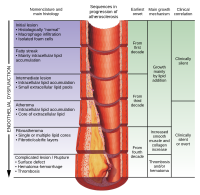
Photo from wikipedia
Atherosclerosis (AS) is a chronic inflammatory disease that serves as a common pathogenic underpinning for various cardiovascular diseases. Although high circulating branched-chain amino acid (BCAA) levels may represent a risk… Click to show full abstract
Atherosclerosis (AS) is a chronic inflammatory disease that serves as a common pathogenic underpinning for various cardiovascular diseases. Although high circulating branched-chain amino acid (BCAA) levels may represent a risk factor for AS, it is unclear whether dietary BCAA supplementation causes elevated levels of circulating BCAAs and hence influences AS, and the related mechanisms are not well understood. Here, ApoE-deficient mice (ApoE−/−) were fed a diet supplemented with or without BCAAs to investigate the effects of BCAAs on AS and determine potential related mechanisms. In this study, compared with the high-fat diet (HFD), high-fat diet supplemented with BCAAs (HFB) reduced the atherosclerotic lesion area and caused a significant decrease in serum cholesterol (TC) and low-density lipoprotein cholesterol (LDL-C) levels. BCAA supplementation suppressed the systemic inflammatory response by reducing macrophage infiltration; lowering serum levels of inflammatory factors, including monocyte chemoattractant protein-1 (MCP-1), tumor necrosis factor-α (TNF-α), interleukin-1β (IL-1β) and interleukin-6 (IL-6); and suppressing inflammatory related signaling pathways. Furthermore, BCAA supplementation altered the gut bacterial beta diversity and composition, especially reducing harmful bacteria and increasing probiotic bacteria, along with increasing bile acid (BA) excretion. In addition, the levels of total BAs, primary BAs, 12α-hydroxylated bile acids (12α-OH BAs) and non-12α-hydroxylated bile acids (non-12α-OH BAs) in cecal and colonic contents were increased in the HFB group of mice compared with the HFD group. Overall, these data indicate that dietary BCAA supplementation can attenuate atherosclerosis induced by HFD in ApoE−/− mice through improved dyslipidemia and inflammation, mechanisms involving the intestinal microbiota, and promotion of BA excretion.
Journal Title: Nutrients
Year Published: 2022
Link to full text (if available)
Share on Social Media: Sign Up to like & get
recommendations!